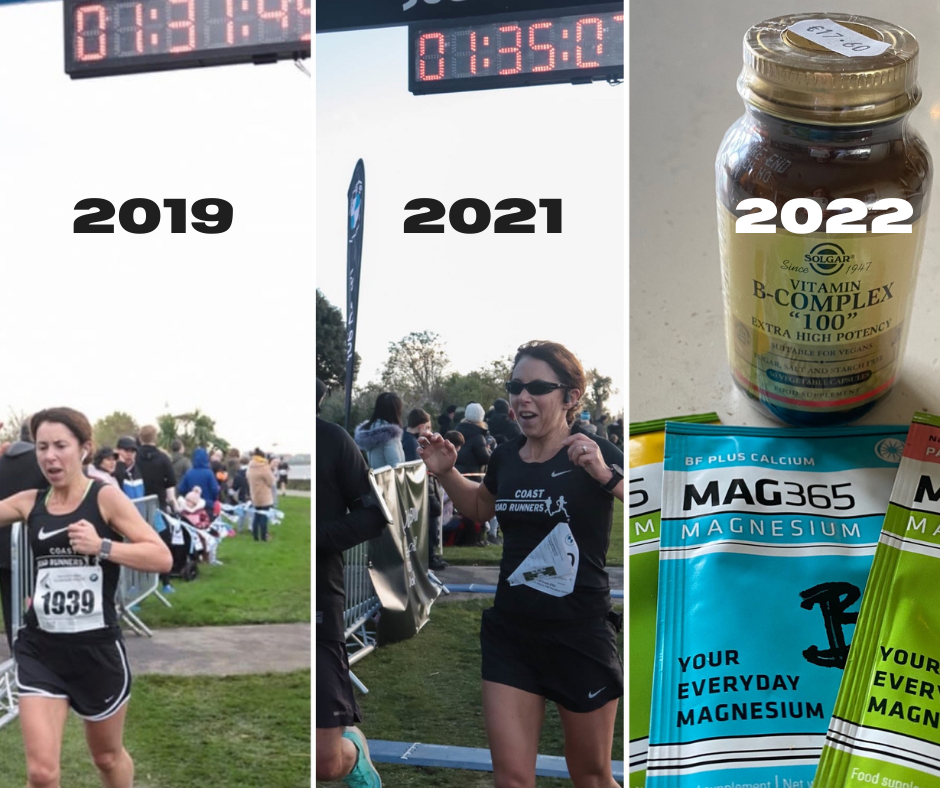Everyone knows that as we age, we get slower. I have always known this in terms of my running and for quite a while now I have said it’s only a matter of time before I stop setting new PB’s. What I didn’t know however was that it is the time of the month or my biological clock that is now dictating my running time rather than my time on this earth!
This realisation initially dawned on me earlier this year. I even wrote a blog about it click here. Over the past few months I accepted that as I transition to perimenopause, there is one week in each month that running is much more challenging. I now term this week The Week. The week being the week before my period. Rather than be concerned about my pace in that week, I accepted that despite my body feeling that it is really working itself, my speed doesn’t reflect the effort I put in. So basically my body is working as hard as it ever does in that week but the output is slower aka my pace is slower.
As frustrating a realisation as this was to accept, I accepted it and moved on. Until 2 weeks ago. I ran my first race (half marathon) in 2 years. The November 2021 Clontarf Half Marathon. Sod’s law the race was in The Week. I didn’t think about it too much before or during the race. I was just really happy to be back doing real in person races. Like every race I have ever done I pushed myself. The way I felt during this race I honestly felt like I was pushing myself more than ever. There was never one moment during the race where I felt like I was cruising despite pushing myself, something that I have often felt during races. As always I never clock watch during races so when I got to the finish line and saw 1.35.07 above my head I was honestly gob-smacked. I couldn’t believe that despite the exertion that I put in to the race this was my resulting finishing time.
Now don’t get me wrong. For any normal runner this is a pretty great time. And I placed 7th in female finishers, 3rd in my age category (over 40’s). My view on this time is purely from a personal best perspective. My PB for this same race 2 years ago was 1.31.45 In running terms this is a seriously big variation. So you can only imagine the post-race post mortem that I did on this one! So here are a few factors that differentiated this race from the same race 2 years ago:
1. In November 2019 I was race fit. In November 2021 I hadn’t run a race for 2 years.
2. I tore my calf muscle less than 2 weeks before the November 2021 race.
3. The November 2021 race was approximately 2 years in to a global pandemic.
4. I had to battle seriously strong winds during the November 2021 race.
5. The November 2021 race was during The Week.
At a glance, the combination of these 5 factors could easily result in over 3 minutes being knocked off a PB. However on closer examination there is one overriding factor that caused the slower time.
Race Fit. In November 2021 I hadn’t run a race for 2 years. This is the longest amount of time since 2012 that I hadn’t run a race. I was still very fit going in to the November 2021 race as I had been running constantly and well for the most part, and had done some pretty good race pace running in my training runs. I had even run the same route earlier in November and had run it at a faster pace than in the November 2021 race. And it had felt less effortless then. So my slower time was not overly due to me being not race fit.
Torn calf muscle. Approximately 2 weeks before the November 2021 race I tore my calf muscle. Not running but playing tennis. I started playing tennis again during one of the multiple lockdowns after a c. 20 year break. During a very low key doubles game I tore my calf muscle. It was only a very slight movement that caused it – not a dramatic Wimbledon style winner shot. After having never injured myself running this was quite a shock to learn that my legs are not injury proof. I was advised by a physio not to run for c. 10 days. This is the longest time that I haven’t run since being pregnant. After running for so many years this wouldn’t dent my fitness. And I didn’t feel even the slightest niggle in my calf during the November 2021 race. So this isn’t the root cause of my slower time either.
Global pandemic tiredness. A lot of people are feeling worn out by the pandemic. And I am one of those people. But in general I am not tired in terms of my running energy so as much as we can blame the pandemic for a lot of things, I can’t finger point it on this particular occasion. Especially as I had been churning out some good running paces in the lead up to the November 2021 race.
Strong gusty winds. Clutching at straws. Sorry I can’t blame the wind as running along the coast in strong winds is second nature to me as it’s where I run all the time. So yes a strong windy day can impact my running time but not by as much as 3+ minutes. As no matter what strength the wind is, it is always on your back at some stage so running in to the wind is somewhat off-set by when it’s on your back
The Week. So sadly, the award for what caused the demise of my half marathon PB goes to The Week. For months I have found running during the Week much harder than any other week in the month. It’s not just that it feels harder and I am running as fast. It feels harder but I am running slower.
When I look back on my running stats I am averaging a slower pace during these weeks compared to the rest of the month. Unfortunately this pattern carried through to a race day. In all my running years, I have never run slower during a race than during training. I don’t race very often – maybe 2-3 half marathons and 1 marathon a year. So I can’t pick and choose when I race as there are only a few key races that I do. Which largely depends on the time of year as I don’t race during the warmer months.
I don’t want my menstrual cycle to dictate what races I do and when but unfortunately this cycle now impacts my race performance. Up until this year (I turned 45 in February 2021) I never gave much thought to my menstrual cycle. It has always been regular and still is. And I never (thankfully) suffered from PMT etc. Until this year. So this really is an age thing. Or aging thing. The worst thing about realising this is that I always knew that age would catch up with me and my running but I presumed this would be due to aging bones and muscles etc. Not my biological clock. For so many years women have been told that their biological clock is ticking from a having children point of view but I never knew that it would be ticking in terms of running. Now that I know this, I am on a mission to find ways to counteract this aspect of my biological clock.
I have done a small bit of research on the topic but plan on doing some more. The Week is known as the Luteal phase of the menstrual cycle. During this phase Progesterone and Oestrogen levels start to rise – the combination of these hormones can cause changes that make performance more challenging. One article I read lists some common changes that you may notice during the luteal phase. They include “increased heart rate (of up to 10 beats/min or more), breathing may be more laboured, your energy and motivation to train may be lower”. I can tick all those boxes.
The way that I feel when I’m running during The Week is like driving a car in the wrong gear. If you are driving in gear 1 and have your foot flat down on the accelerator, you can hear the engine roaring loudly and working really hard but the car just isn’t moving properly. It’s making lots of noise but is driving slowly. Once you change gear, the engine quietens down and the car drives faster. And feels effortless. This is how I feel running after The Week. Well maybe not effortless but it feels a hell of a lot less effortful than during The Week.
The question now is what can I do to try to counteract these symptoms? According to one article I read “Dietary choices can make a big difference in how you feel. Make sure that you’re getting plenty of magnesium, B-complex, calcium, iron, and healthy fats. During the luteal phase make sure that you’re focusing on a recovery drink or meal with protein post-workout because progesterone can cause the increased breakdown of protein. Avoiding alcohol during the luteal phase can also help decrease bloating and abdominal upset. Drinking plenty of water during this phase is also very important.”
I already have a varied diet so should have fairly good levels of these recommended nutrients and I drink plenty of water and limited alcohol throughout the month. But in the interest of seeing if changes to my diet during The Week can help my running, I am going to start taking some different supplements each month. So the first thing that I am going to try this month is to start taking B-complex supplements in the lead up to and during The Week as these play an important role in releasing energy from the foods we eat. Depending on how that goes, I might start introducing some Magnesium supplements.
Before I go too far down this road of possible trial and error, if anyone reading this has any first hand experience in this area I would love if you could share it with me either on our Facebook/Instagram pages or via email to hello@coastroadrunners.com. By sharing you could be helping me and countless other women get through this phase of our lives. And help level the racing playing field amongst men and women so we are all running against the same clock.


